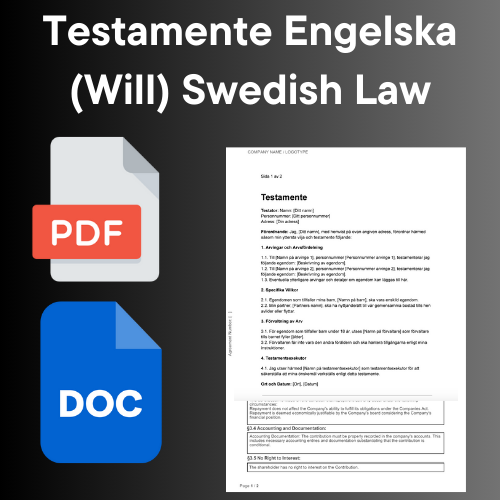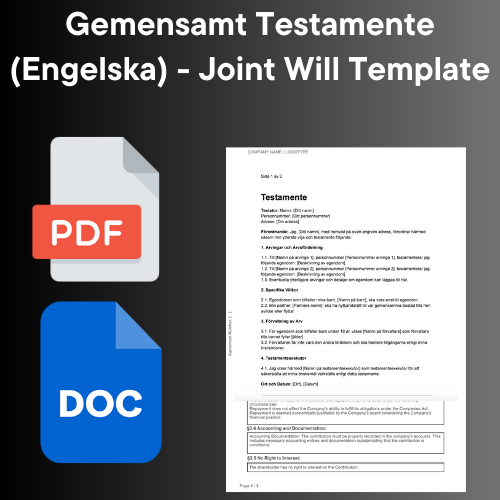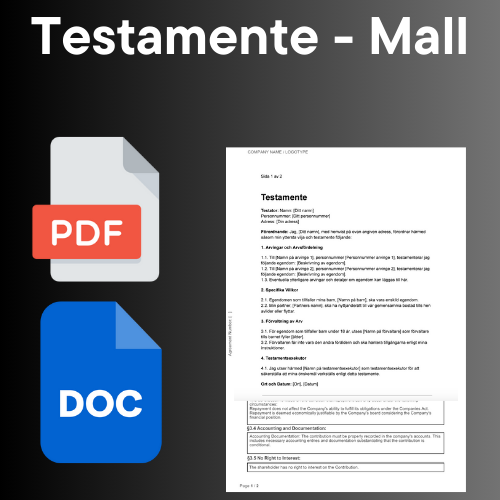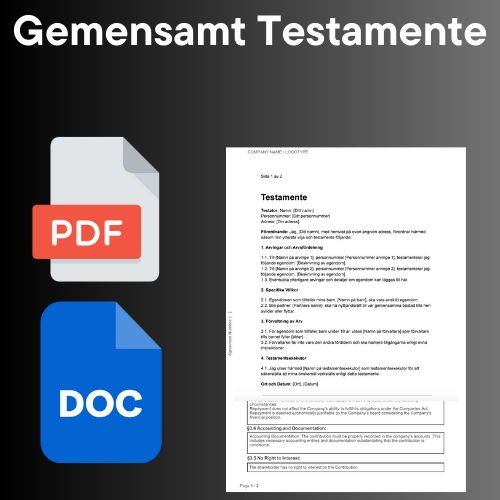Everything you need to know about Wills in Sweden
Share
Everything you need to know about Wills in Sweden
Table of Contents
- Introduction
- Basic Concepts and Requirements
- Registration and Storage
- Special Provisions and Concepts
- Creation of a Will
- Amendments and Additions to the Will
- Common questions and answers
- Practical Tips
- Examples and Practice
- Termination
Introduction
Making a will is a crucial step in ensuring that one's property is distributed according to one's wishes after death. The will is a legally binding document that can prevent disputes and uncertainties among survivors. In Sweden, wills are regulated by the Inheritance Code (ÄB), and it is important to know the formal requirements and regulations that apply. This article provides a comprehensive overview of everything you need to know about wills, from basic concepts and requirements to practical tips and frequently asked questions.
Basic Concepts and Requirements
Form requirements for Wills
- Writing: The will must be in writing and cannot be oral.
- Signature: It must be signed by the testator, the person who draws up the will.
- Witnesses: Two independent witnesses must be present and sign the will. These witnesses must be over 15 years of age and must not be related or cohabiting with the testator, nor be legatees.
- Original document: The will must be in original. Copies are not valid under the law.
Registration and Storage
In Sweden, there is no central register for wills. It is the testator's responsibility to keep the will in a safe place. It is also wise to inform those covered by the will of its existence and storage location. If the will cannot be found after the testator's death, it may lead to the assets being distributed according to the legal order of succession instead of according to the testator's wishes.
Special Provisions and Concepts
Arvslott and Laglott
The inheritance is the part of the estate that accrues to an heir by law. The legal lot is half of the inheritance lot and is the part that a breast heir (child, grandchild) is entitled to regardless of what is written in the will. This means that a parent cannot disinherit his children through the will.
Free Right of Use and Full Ownership
- Free right of disposal: The heir can use and dispose of the property freely, but cannot bequeath it.
- Full ownership: The heir has full right to dispose of the property and can also bequeath it.
Special litter child
Special children are children from previous relationships who have the right to receive their inheritance immediately when a parent dies, regardless of whether there is a will. This is in contrast to joint children, who usually have to wait until both parents have passed away if there is a will stating this.
Creation of a Will
Write a will yourself or with a lawyer
It is possible to write a will yourself, but it is often recommended to hire a lawyer to avoid formal errors and legal doubts. This is especially important if the legal situation is complex, for example in the case of ownership of several properties or part ownership of companies.
Executor
An executor is a person appointed to administer the estate and ensure that the terms of the will are followed. It is not a requirement to have an executor, but it can be beneficial in complex cases where there may be a risk of disputes.
Amendments and Addenda to the Will
Change or Update Will
The testator can change or update his will at any time. When a new will is written, the old will automatically become invalid. It is also possible to make additions to an existing will, but the same form requirements apply for each change.
Storage of Wills
Since the will must be in the original, it is important to keep it in a safe and easily accessible place. It may be wise to keep it in a safe deposit box or with a lawyer, and to inform those concerned of its whereabouts.
Common questions and answers
Can you bypass the Inheritance Order?
A will can change the legal order of inheritance, but there are limitations. Breast heirs are always entitled to their legal lot, which means that they cannot be completely disinherited by will.
What happens if the Will is not Witnessed?
If the will is not witnessed as required by law, it is not valid. The witnesses must be independent and must not be related or cohabiting with the testator.
What happens if the Testator is Deceased?
If a beneficiary is deceased at the time of the testator's death, there may be rules in the will that state what should happen to that part of the inheritance. If no such rules exist, the inheritance can be distributed according to the legal order of inheritance.
Can cohabitants inherit from each other?
Cohabitants do not inherit from each other according to Swedish law, regardless of how long they have been together. In order for cohabitants to inherit from each other, a will must be drawn up. This is especially important if there are common children or special litter children.
Practical Tips
Preparation and Planning
- Overview of assets and liabilities: Make a detailed list of all assets and liabilities. This makes it easier for the heirs and reduces the risk of disputes.
- Regular updates: Life situations change, and it is important that the will reflects current wishes and circumstances. It can be good to review the will regularly, for example in the event of major life events such as marriage, divorce, or the birth of a child.
Important words
- Mutual will: A joint will between spouses or cohabitants where they bequeath to each other or to joint heirs. This can be a good option to protect the surviving party.
- Individual Property: By stating that certain property must be individual in the will, you can protect it from being included in a possible future division of the estate for the heir.
Examples and Practice
Example of Inheritance Situation
Barbro and Kenneth are married and have two children together, Nicke and Stina. Barbro also has a child from a previous relationship, Sigge. If Barbro dies without a will, Kenneth inherits everything, but Sigge has the right to claim his inheritance right away because he is a special child.
Interpretation of the Several Testaments
If there are several wills and none of them expressly revokes the other, the most recent will generally applies. However, if the latest will only concerns certain parts of what is mentioned in the previous will, both wills may be interpreted together.
Termination
Writing a will is an important act to ensure that one's assets are distributed according to one's wishes after death. By following the formal requirements and regularly updating the will, you can reduce the risk of disputes and uncertainties among survivors. It is always wise to consult with a lawyer to ensure that the will is legally correct and meets all legal requirements.
This article has provided a comprehensive review of what is required to write a valid will in Sweden, which legal concepts are important to know, and practical tips to facilitate the process.




